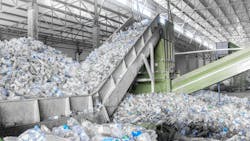GR3N and Schneider Electric Partner on Automation for Advanced PET Recycling
GR3N has developed a process to break down polyethylene terephthalate (PET), a common material for plastic bottles, into chemical building blocks to create new PET pellets for packaging and textiles manufacturing.
The company is using the Schneider Electric Ecostruxure Automation Expert system to decouple hardware from software, allowing devices and equipment to be freely connected across architecture layers.
GR3N’s process, microwave assisted depolymerization, or MADE, uses a technology called alkaline hydrolysis that can manage a higher amount of impurities compared to the existing technologies, according to the Schneider Electric news release.
The demonstration plant represents a new generation of automation systems that intertwine OT and IT layers to enable advanced functionalities for operations management and data analytics, Schneider Electric says.
The company plans to install its first industrial-scale MADE facility in Spain, with a capacity to handle 40,000 tons per year of PET waste.
Fabio Silvestri, head of marketing and business development at GR3N, said automation has helped the company scale its MADE technology and increase flexibility in its operations.
"Through software-defined automation and hardware independence, we have been able to effectively de-risk our operations and push the boundaries of our technology," he said. "We've been able to reconfigure our systems quickly when we see opportunities to improve efficiency, while avoiding supply chain issues due the hardware agnostic nature of the system. This is what is needed to make advanced plastic recycling at reality at scale."
